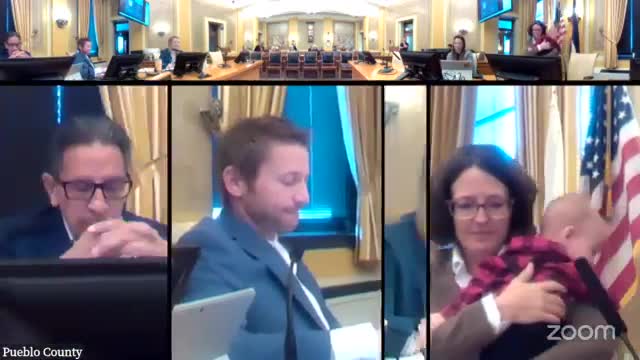Pueblo cannabis industry urges pause on code fee increases; county staff to rework hearing-language and solicit feedback
Get AI-powered insights, summaries, and transcripts
Subscribe
Summary
Marijuana operators told the Pueblo County Board of County Commissioners on Jan. 2 that proposed licensing-code fee increases and other changes would worsen severe cash-flow problems and urged a pause and broader stakeholder talks.
Members of Pueblo County’s marijuana industry told commissioners on Jan. 2 that proposed changes to the county’s marijuana licensing code—especially fee increases affecting medical cultivators—would threaten local businesses and prompted calls for a pause and broader stakeholder engagement.
Sarah Long, the county staff member leading the code revisions, said the draft language under discussion on Jan. 2 repeated the proposals previously shown to the commission and that staff had met with industry representatives to hear concerns. Long said most feedback was neutral or clarifying but that comments about fees—particularly for medical cultivation—warranted further conversation.
Several industry speakers told the board the market is sharply down and that county fee increases would add pressure. Richard Quessel, identified as representing Heartland Cannabis Products, described dramatic declines in revenue and difficulties collecting accounts receivable: “We’re currently lucky to get about 40% of the sales that we did last year,” he said, and later reported that Heartland’s sales were roughly $4,700,000 last year with net earnings of about $114,000. Quessel described multiple rounds of layoffs and efforts to keep employees paid without owner distributions. He asked the board to pause any action until county leaders and industry representatives could meet to review market realities.
Sean Honecker of Yeti Farms and other operators echoed the request for a pause. Honecker said the industry struggles with cash flow and enforcement costs and urged a delay on fee modifications: “I think it’s a good idea to push this off and discuss a little bit more later pertaining to any more fees,” he said.
Industry speakers raised multiple specific complaints about operating conditions, including: county inspections and fines (one speaker cited a $25,000 penalty tied to a surveillance system issue), higher contractor charges because businesses are identified as cannabis-related, elevated property taxes, and different treatment for hemp producers. Several speakers asked the board to convene an industry-wide stakeholder meeting and said they had tried to meet with county officials without sufficient follow-up.
County attorneys and staff described two categories of proposed code changes. Sarah Long and Kyle Aber said one set of edits (Chapter 516) would change how hearing-officer orders are finalized to speed up decisions in uncontested cases; staff said those changes would not remove a licensee’s right to request rehearing before the Liquor and Marijuana Licensing Board. Staff proposed separate edits (Chapter 512) that included fee increases, a business-operator license, and an optional one-time $250 application fee to combine multiple license expiration dates into a single annual renewal cycle.
Staff and several commissioners signaled a willingness to refine the 516 language to address industry procedural concerns while pausing fee-related changes to give the incoming board and industry time to meet. “What I can do is re-tweak that 516 language, and then Kyle can send that out to the industry and ask for any, maybe any written feedback on the 516 changes to see if there’s anything, that there are still concerns about,” Long said. Staff proposed keeping the efficiency changes (hearing procedure timing and the optional combined renewal application) under further review and holding broader fee and business-operator changes for additional stakeholder engagement.
Commissioners said they wanted tightened language that prevents unintended discretionary enforcement while preserving the administrative efficiencies staff seeks. One county attorney explained the proposed 516 change was intended to prevent a licensing applicant from being penalized because the licensing board could not meet in time for routine approvals; she and staff described the proposal as already-practiced exceptions in limited circumstances such as late special-event permits.
No ordinance or fee schedule was adopted on Jan. 2. County staff committed to revise the draft language for Chapter 516, circulate it to industry participants for written feedback, and—if no significant objections are returned—bring the refined 516 language to a statutory meeting. The larger package of fee and licensing changes in Chapter 512 will be held for further review and stakeholder meetings with industry and county staff; staff suggested returning the broader package for future consideration after the new board is seated and discussions have occurred.
Industry representatives accepted invitations from at least one commissioner to arrange facility tours and follow-up meetings. Staff reminded participants that Colorado Open Records Act (CORA) requests remain an available tool for parties seeking documentation about how licensing fees are spent.
